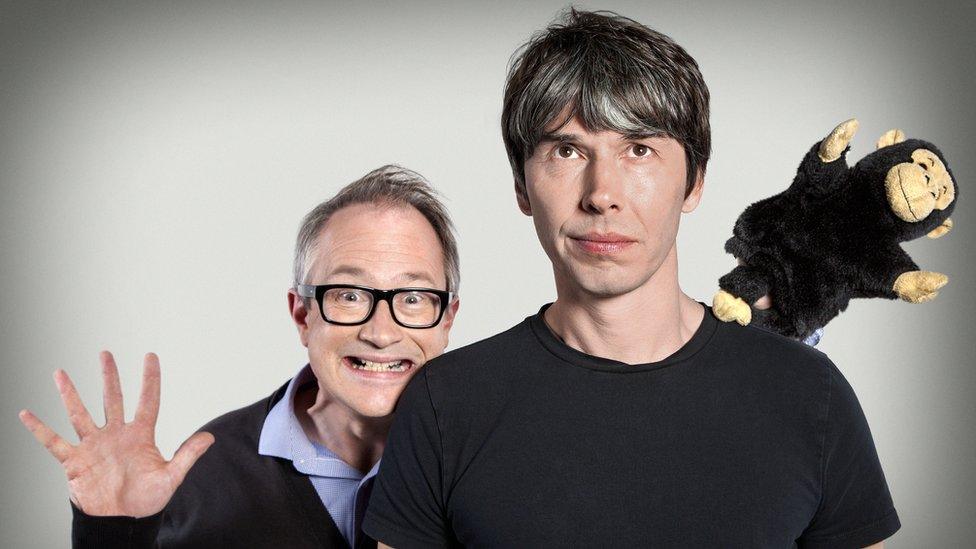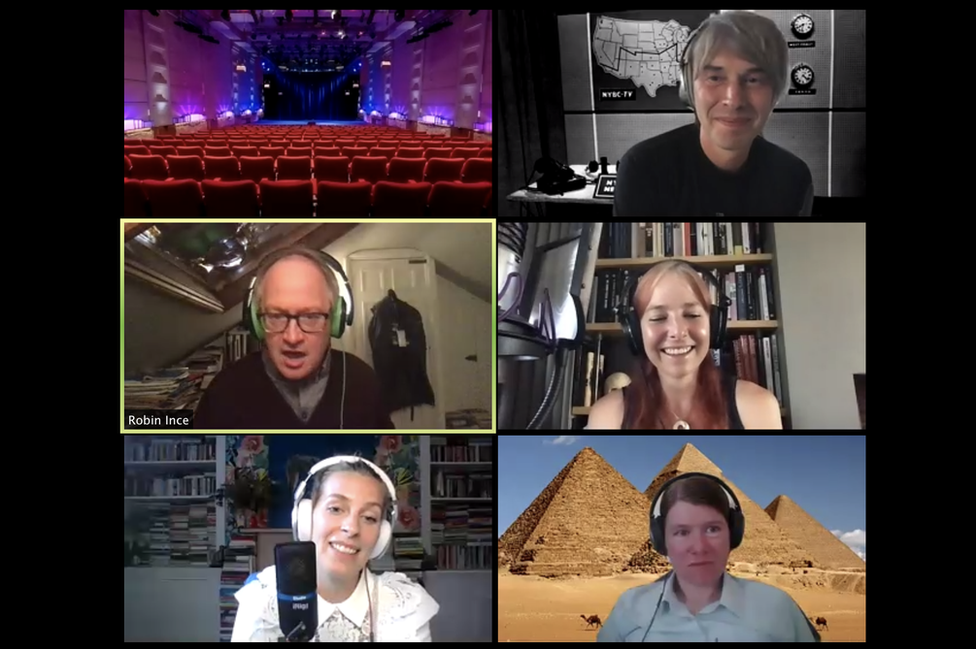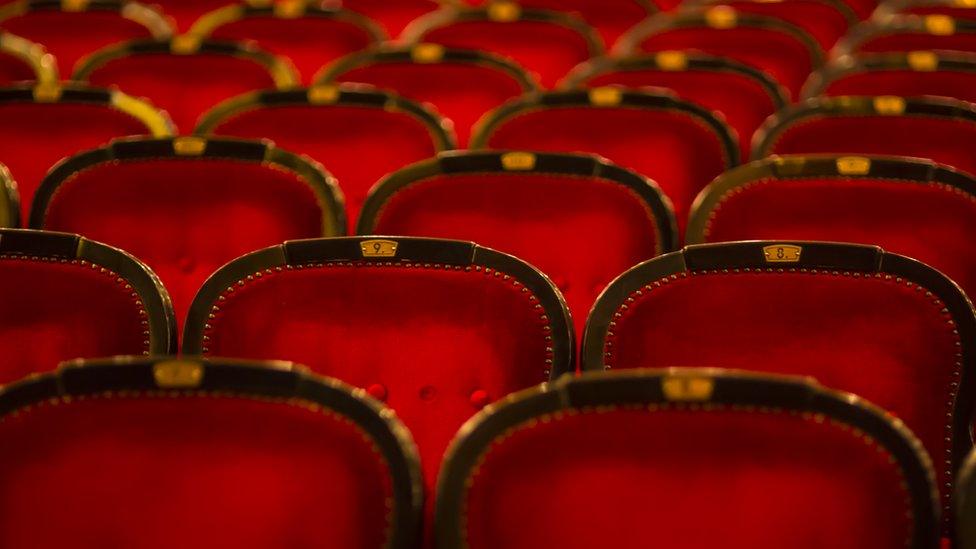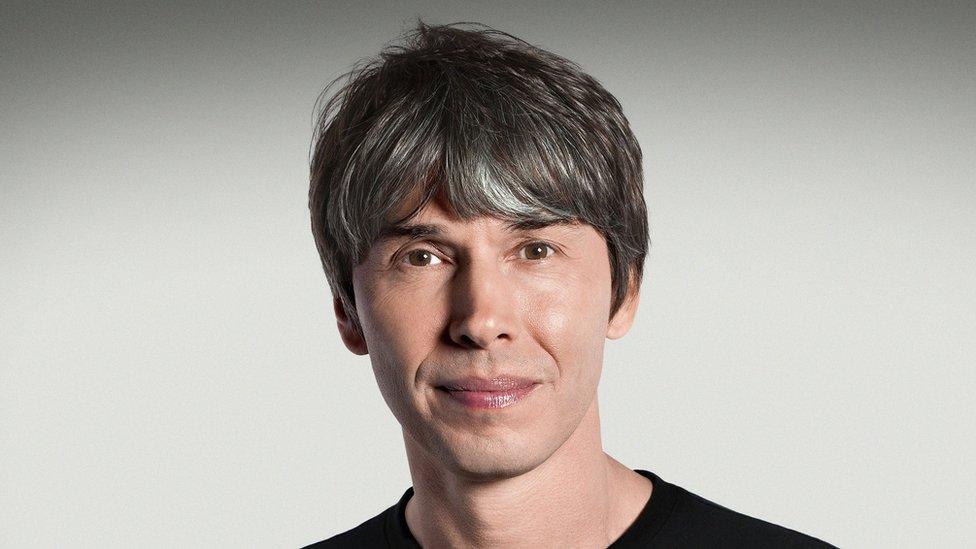The Infinite Monkey Cage: BBC radio show trials virtual audience
- Published

Robin Ince and Brian Cox have co-hosted The Infinite Monkey Cage since 2009
This week, amid the coronavirus pandemic, the BBC has recorded its first programme with a live audience listening from home. Could this be the new normal for radio comedy shows?
"Can you give us a cheer so we know you're there? That's great! Now can you laugh as if I just said something really hilarious?"
It's Monday evening, and Radio 4 producer Sasha Feachem is warming up the audience ahead of a recording of science comedy show The Infinite Monkey Cage.
But we, the audience, are not in the BBC's radio theatre as we normally would be. Instead we've tuned in over Zoom to hear a new episode of the programme being recorded virtually.
For the next hour or so, it's our job to react to whatever the panellists are saying - starting with a quick sound check that sees us clapping, cheering and (fake) laughing.
Behaving as if you're a member of a big crowd when you're sitting at home feels strange. But there's no doubt it adds something we've all been missing from comedy programmes recently - namely, atmosphere.
"That was wonderful," presenter Robin Ince says as the programme gets going. "The idea that there are loads of people sitting alone in their house just applauding, and everyone in their street is going 'Oh my god, is it 8pm on Thursday already?'"

Clockwise from top right: Brian Cox, Alice Roberts, Sarah Parcak, Sara Pascoe and Robin Ince
The Infinite Monkey Cage is the perfect show on which to test out a virtual audience. You can imagine the show's dedicated fans being delighted to take part in a recording which is itself an experiment.
Furthermore, it won't be a major disaster if it doesn't work. Because Monkey Cage is a science programme and not exclusively a comedy show, there isn't the constant reliance on laughter there would be on The Now Show, Dead Ringers or Just A Minute.
Ince and co-host Brian Cox tell the at-home audience the episode will combine space, genetics and archaeology, with guests including comedian Sara Pascoe, biological anthropologist Alice Roberts and archaeologist Sarah Parcak.
And with that, we're off.
The panellists rattle through topics including Ancient Egypt, undiscovered civilisations in Africa and how much Neanderthal DNA is present in humans today.
All the guests appear on screen as part of a group Zoom meeting - with the audience represented, appropriately, by an image of an empty auditorium.
But in every other way, it's just like a normal episode of The Infinite Monkey Cage.
As audience members we can hear each others' reactions to what the panel says, which itself encourages us to laugh or clap more.
We can't see each other, so it's not clear how many of us there are. But even a crowd with fewer than 100 people in it is enough to add some much-needed pace and momentum.

It is unclear when audiences will be able to return to TV and radio recordings
There's only one technical hitch in the whole recording, which comes just as Parcak is discussing early erotic poetry.
"One of my favourite things to do if I'm teaching an archaeology class around Valentine's Day is to read ancient Egyptian love poetry - and it will turn your ears purple," she laughs.
"It's incredibly erotic, they were extraordinarily expressive of love. They talk about having their hearts broken, cheating husbands, the same stuff we read today - it's glorious."
At this point, producer Sasha has to interrupt the recording briefly to fix a technical problem with one of the microphones.
"Isn't that typical!" jokes Ince. "Just as we get to the filth. Typical BBC, isn't it?"
Fortunately things get back on track and Parcak picks up with a tale of some of the earliest recorded pornography.
You can hear the audience laughing heartily as she describes Egyptian papyrus that featured drawings of dancing lions or cats playing games on one side and erotic drawings on the other.
"That's essentially the internet now - it's half porn and half cats playing the piano," jokes Pascoe, prompting much laughter from the virtual crowd.
This recording is the first proper attempt by the BBC to recreate what live comedy used to be like, before the coronavirus pandemic.
Some comedy programmes have struggled to maintain their usual momentum recently, including Have I Got News For You and The Graham Norton Show.
While the quality of the writing and the interviews on these recent episodes may be as strong as ever, the jokes still fall flat when met with the sound of silence.
Several programmes are having to film without a live studio audience
And so, depending on what the finished product is like once it's edited, Monkey Cage could provide a blueprint of how comedy shows will sound for the next few months or more.
The episode we attend on Monday, which will be released as a podcast next week, lasts a little over an hour and will be chopped down to about 30 minutes.
It's hard to predict how it will sound on air. During the recording the noise of other audience members is relatively quiet in the mix, so as not to drown out the panellists.
But when everything is mixed for broadcast, and the audience can be heard at normal volume, it's likely the presence of a crowd will make a significant difference.
There's no doubt that the programme is better, funnier and livelier with a virtual audience. It's not perfect, and certainly not as good as the real thing. But until some kind of normality can resume, it works perfectly well for now.
As Ince puts it: "What a strange, beautiful thing it is. We're alone but we're together."

Follow us on Facebook, external, or on Twitter @BBCNewsEnts, external. If you have a story suggestion email entertainment.news@bbc.co.uk, external.
- Published28 April 2020

- Published9 December 2019
